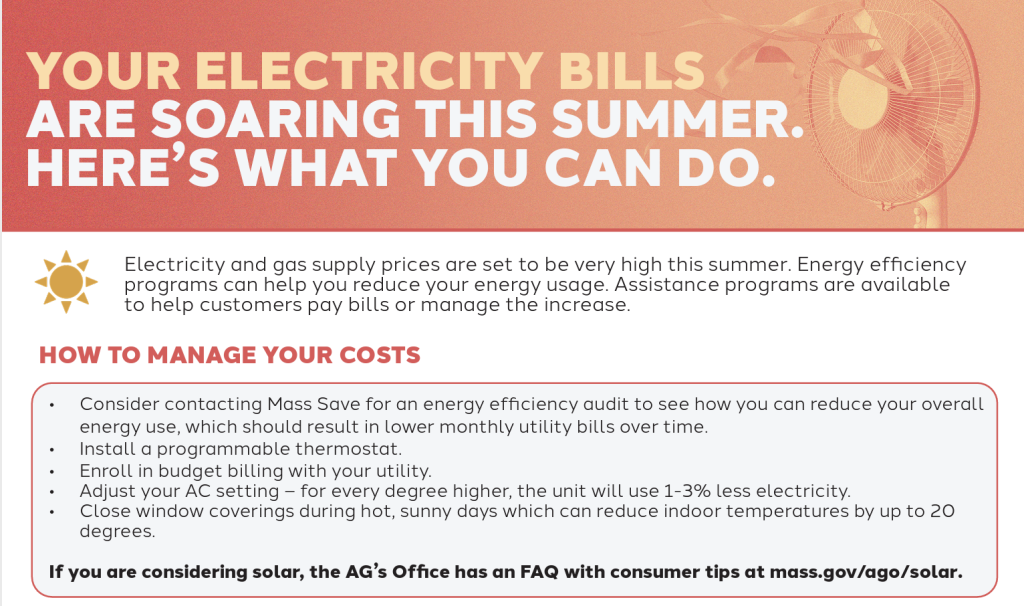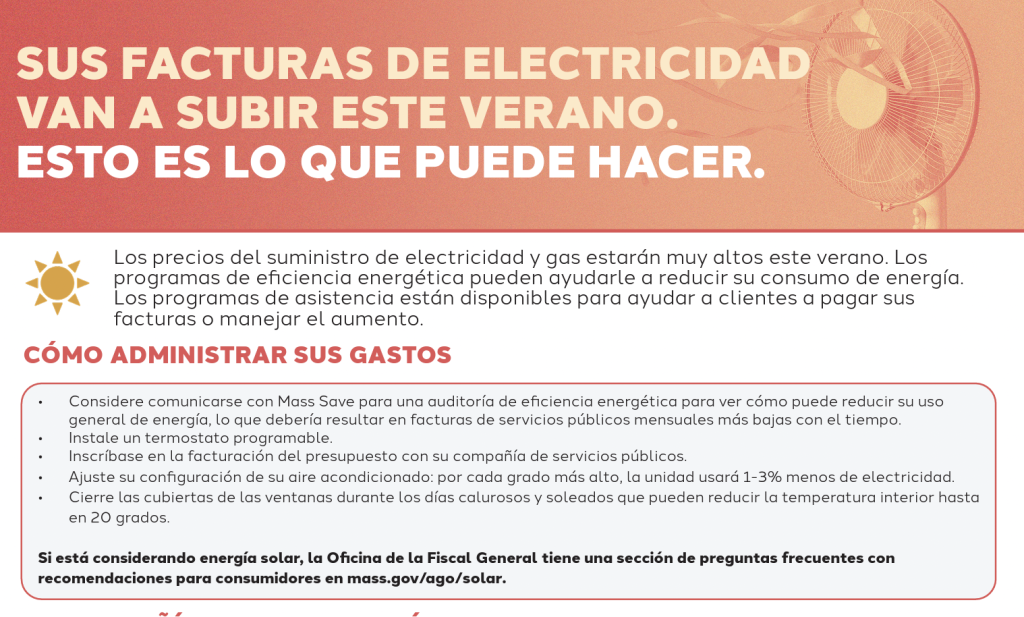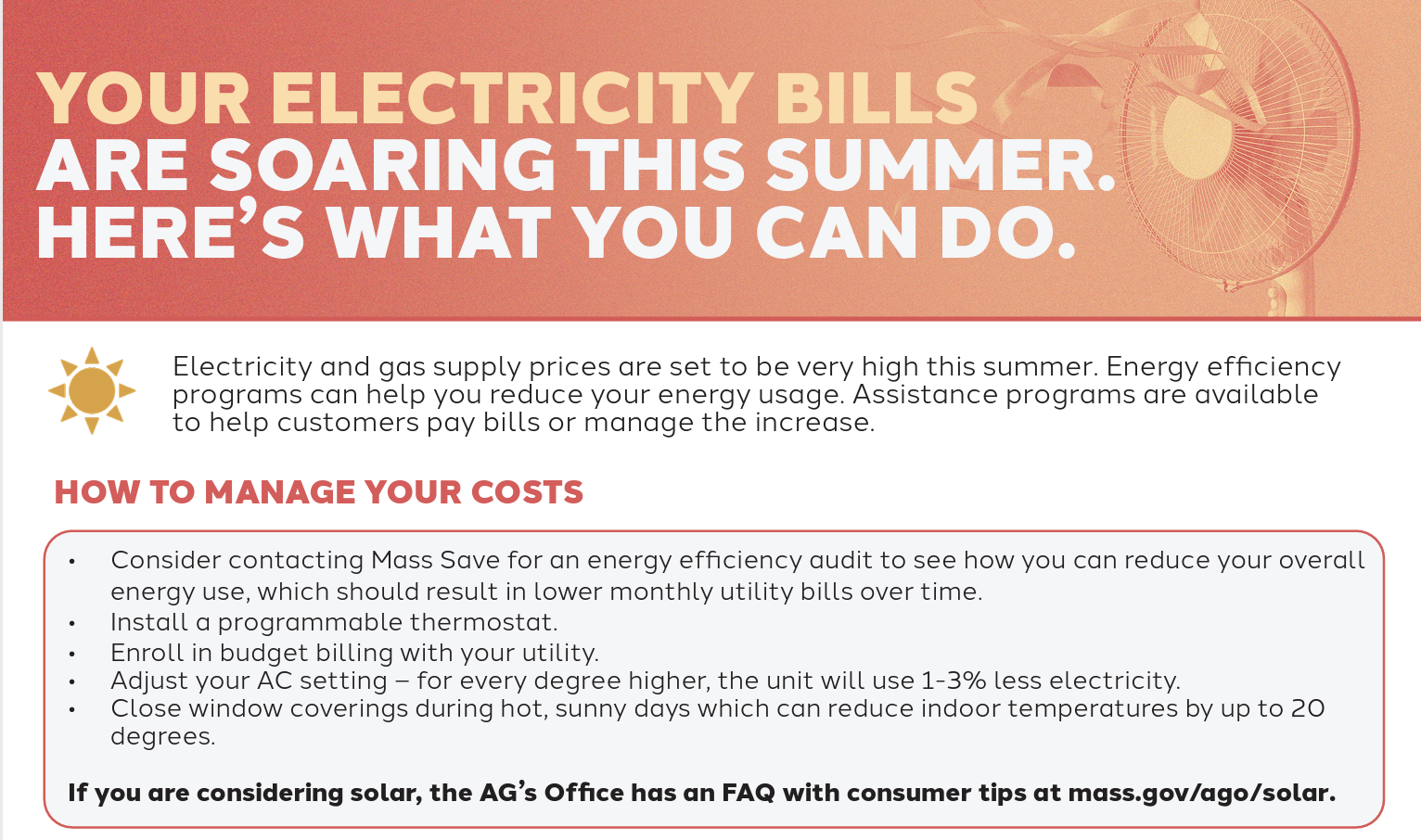[broadstreet zone=”99032″]
BOSTON – With electricity rates set to soar to record high prices this summer, Attorney General Maura Healey yesterday, June 29, launched a campaign to educate customers across the state about the programs available to help them reduce their energy usage and lower their bills.
Inflation, the ongoing war between Russia and Ukraine, and other factors are driving up fossil fuel prices and in turn energy rates for customers across the country this summer.
Starting July 1, Eversource basic service rates in the company’s eastern division will rise to 17.871 cents/kWh – a more than 30 percent increase on a monthly bill in comparison to last summer’s rates of 10.753 cents/kWh.
With this new rate residential Eversource basic service electric customers with average usage will see their monthly bill jump to $212.15 from $160.29 last summer. Customers with Eversource’s western division or other utilities should also expect to see a smaller but still significant increase to their bills over last summer.
[broadstreet zone=”59983″]
As part of this new education campaign, the AG’s Office is working with service organizations and municipalities across the state to educate customers on the new rates and the available financial assistance programs. The campaign will include multilingual radio PSAs, multilingual flyers, an updated website, as well as trainings and webinars.
“As temperatures rise this summer, so will your monthly bills. We want families who are worried about paying their monthly bills to know that help is available to manage these record high energy rates,” said AG Healey. “My office will continue to be a resource for customers looking for guidance on lowering energy usage and ways to cut down on costs in the coming months.”
[broadstreet zone=”59948″]
Lower your energy usage
The AG’s Office recommends that customers consider contacting Mass Save for an energy efficiency audit to see how they can reduce their overall energy use, which should result in lower monthly utility bills over time.
Customers can also lower their bill by adjusting their air conditioner setting, either manually or by installing a programmable thermostat – for every degree higher, the unit will use 1 to 3 percent less electricity.
Closing window coverings on hot sunny days can reduce indoor temperatures by up to 20 degrees.
Customers who are interested in reducing energy usage through solar panels or community solar programs should first visit the AG’s Office FAQ with consumer tips at www.mass.gov/ago/solar.
[broadstreet zone=”59946″]
Enroll in a payment plan with your utility
Massachusetts utility companies offer several financial assistance programs for customers, including flexible payment plans – regardless of income. The AG’s Office encourages customers who are experiencing difficulty paying their monthly bills to contact their utility as soon as possible to learn about the options available to them and other ways to reduce energy use and lower bills.
Customers who enroll in and follow a payment plan with their utility company are protected from having their service shut off for the duration of the plan. Most utility companies are providing payment plans for up to 12 months. Customers should also consider enrolling in budget billing with their utility, which will establish more predictable payments and can thus help customers better manage utility costs that often fluctuate depending on the season, the price of energy, and customer usage.
[broadstreet zone=”59984″]
Look into income-eligible assistance programs
The AG’s Office encourages customers who are struggling financially to consult with their utility company to see if they qualify for an income-eligible rate, which provides a discount on the customer’s entire bill. Customers could be eligible for low-income assistance, even if they have not been eligible in the past, as eligibility is based on the last four weeks of gross household income.
Customers may also qualify for a balance forgiveness or arrearage management programs (AMP). The AMP provides for an individualized payment plan that, if followed, allows all or a portion of a customer’s outstanding unpaid balance to be forgiven.
Customers who have a household income that is between 60 to 80 percent of the state median income may be able to seek help from the Good Neighbor Energy Fund.
[broadstreet zone=”54526″]
Beware of competitive suppliers
The AG’s Office urges customers to beware of deceptive competitive electric suppliers who may try to take advantage of this summer’s high rates and lure customers in with a promise of cheaper electricity. A report released by the AG’s Office in April 2021 showed that Massachusetts customers who received their electricity from competitive suppliers were charged $426 million more on their bills than if they would have stayed with their utility. The AG’s report also found that these suppliers charge low-income residents and residents in communities of color higher rates for their electricity.
As the ratepayer advocate for Massachusetts, AG Healey’s Energy and Telecommunications Division works to ensure reasonable prices, access to clean energy for all customers, and to educate them on the available programs that will help them keep the lights on and stay cool.
For more information on electric prices and the available assistance programs view the AG’s new resource flyer and webpage, which includes contact information for the state’s utility companies. The resource flyer – which is available in Spanish and Portuguese and will be available in Haitian Creole, Mandarin, and Vietnamese – will be provided to community organizations including consumer advocates, municipal associations, nonprofit service organizations, and food pantries. Customers who have concerns about their utility rights should contact the AG’s consumer assistance hotline at 617-727-8400 or file a complaint online.




